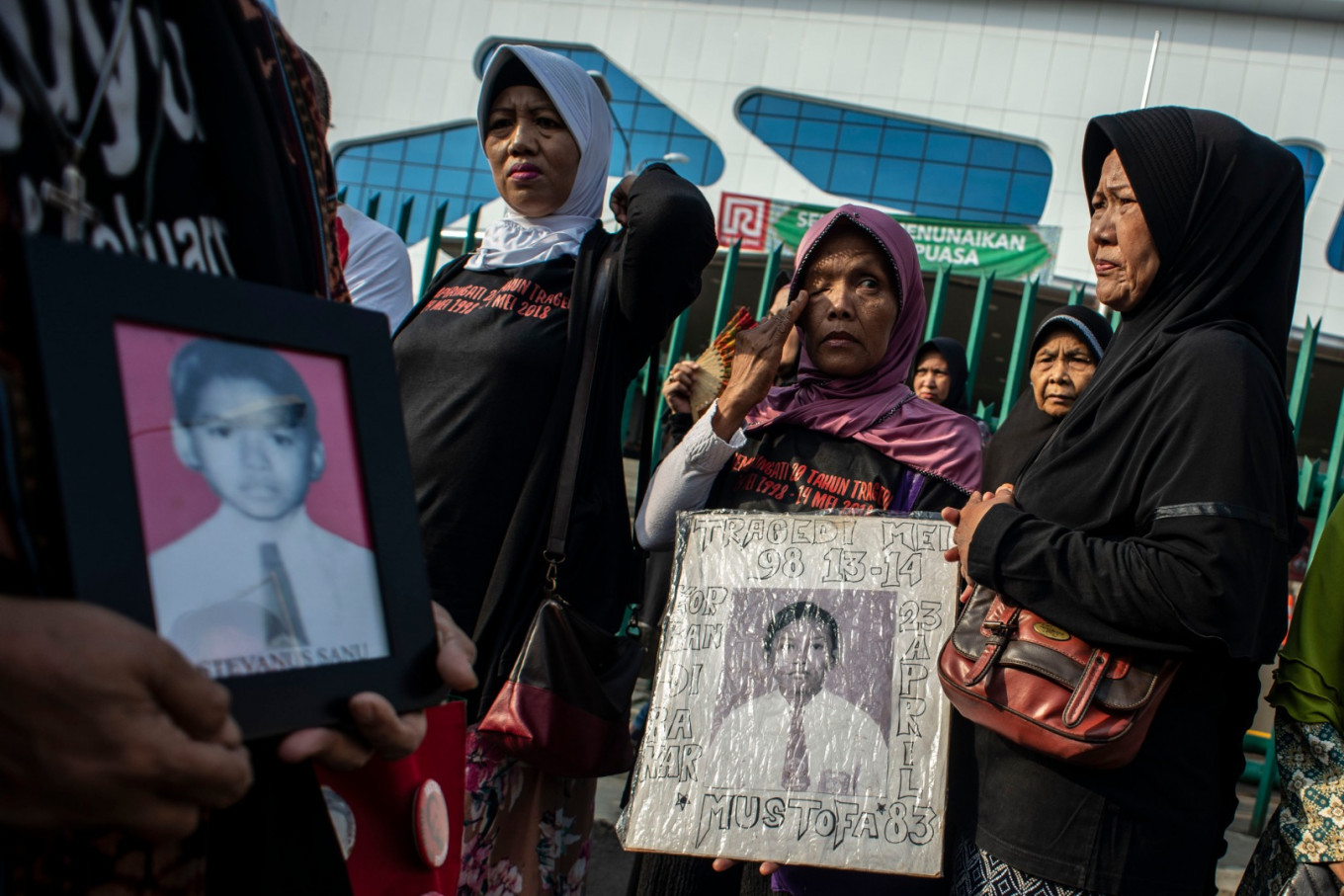Popular Reads
Top Results
Can't find what you're looking for?
View all search resultsPopular Reads
Top Results
Can't find what you're looking for?
View all search resultsRape and rage: Remembering May 1998 riots
While anger has a bad reputation, in world history, anger has brought many changes, including women’s suffrage, civil rights and the #MeToo movement.
Change text size
Gift Premium Articles
to Anyone
I
n films and books, we have witnessed the anger and aggression of male protagonists; they fight, punch objects and even people, they roar, they shoot and/or go to war. On the other hand, female protagonists are presented as calmer, gentler and more reserved. They wait and if they are upset, they cry. If women are in danger, they seek for help and usually men will come to be their saviors.
Perhaps it’s no wonder that many people have asked me: “Why are the female characters in your novel Dari Dalam Kubur so angry?” Indeed, the two main characters of my recent novel do express their rage, although at different degrees, but the question for me should be: “Why don’t more women express anger if severe injustice against them has not been acknowledged?”
In Indonesia, rape against women seems to be more accepted than women’s rage. Violence after violence against women have happened. In 1965, the sexual abuse and rape of women alleged to be communists were widespread. After that, more sexual abuse and rape of women followed, such as in Aceh, Timor Leste, Papua, Surakarta in Central Java and Jakarta in May 1998.
These horrific incidents have not been officially admitted by the government, yet the efforts of preventing sexual violence have faced many hurdles. Since 2012, the National Commission on Violence Against Women (Komnas Perempuan) initiated the sexual violence eradication bill.
Only in June 2016, the bill was included in the Priority National Legislation Program (Prolegnas). However, since then, attempts to pass the bill have been stalled. In July 2020, the bill was even removed from the Prolegnas and rescheduled for discussion in 2021.
Several women’s organizations and activists have been advocating tirelessly for the bill in order to address the continuing sexual violence targeting women. Yet there has been no promising response from the government, and women are still expected to be patient and wait.
To forgive and forget is the “mantra” in Indonesia. Survivors’ discourse is full of forgiveness, and while I really appreciate women who can forgive, many women who claim that they have forgiven often hide their rage and anger deep inside. Why is it so difficult for female victims of human rights abuses to admit that they are still angry?
From a very young age, girls have been expected to muffle their anger. They are taught to cover themselves much more than boys, as well as restrain themselves and not to hold strong opinions. As a result, assertiveness and expressiveness in girls are not encouraged. How many times have we heard girls being told, “Don’t be like that! You are a girl!”, if they did something considered too “provocative” or “aggressive”.
On the other hand, boys are often more encouraged to have adventurous and expressive behaviors; they can climb trees, jump around and express opinions without being told off. In short, they can be more “naughty”. What are seen as aggression and antisocial behaviors in girls are usually taken as signs of leadership, masculinity and confidence in boys. Emotions such as fear and sadness in boys are usually not encouraged because they are considered signs of weakness.
Many linguists have noticed the difference between the female and male use of words, with females being more indirect and polite, whereas males are more assertive and expressive. Swear words are often associated with men because aggression in men is often considered normal or accepted. Indeed, girls are often supposed to be more reserved — they are not to use words allowed for boys.
And what can this lead to? When they grow up and have to face aggressions, many women may not know how to assert themselves or defend themselves. To stigmatize women’s anger is indeed a very efficient way to shut them up; it is to deny an important emotion that begs to be let out. This punishes the victims again and again, for if anger is not released, it can easily lead to frustration and depression. Such anger can eat us up from the inside and become self-destructive.
While anger has a bad reputation, in world history, anger has brought many changes, including women’s suffrage, civil rights and the #MeToo movement. In short, anger has tremendous energy and can be powerful in driving social and political transformations. It can function as a warning that something is wrong and needs to be addressed.
It is undeniable that anger is one of the most influential emotions in human life and in society. Thus, rather than curbing it, we should talk about managing it, so that it can be effective as a driving force for social and political transformation.
Twenty-three years since the mass rape in mid-May 1998 took place, and with no acknowledgement from the government thus far, I want to hear more about women’s anger. There should be more rage toward rape, and women’s anger should not be denied and stigmatized but expressed, channeled and utilized to fight against injustice and bigotry in this country.
^^^
The writer is a senior lecturer in languages, cultures and linguistics at School of Oriental and African Studies (SOAS), University of London and the author of the book The End of Silence: Accounts of the 1965 Genocide in Indonesia and the novel Dari Dalam Kubur (From Inside the Grave)










